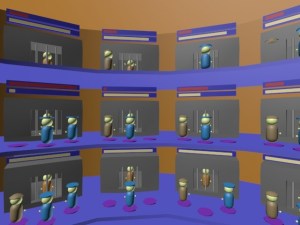Panopticon Pandemonium
This project built a videogame of Bentham’s Panopticon, supported by the UCL Grand Challenges fund. The project is a partnership between ReMAP, Transcribe Bentham, UCL Digital Humanities, and DDZ Games.
You can download the game here. Save it to your computer, unzip it. click on the exe. file to open.

How can videogames help us approach and understand concepts and developments in history, ethics, and society? Building on successes in creating pedagogical videogames (UCL IoE’s DARE research group and MAGiCAL Projects) and public engagement regarding the philosopher and jurist Jeremy Bentham (UCL Bentham Project, UCL Centre for Digital Humanities, Transcribe Bentham) this project has developed a videogame linked to Bentham research, as a form of public engagement addressing UCL’s Human Wellbeing Grand Challenge. Bentham is a totemic figure in UCL culture, yet he remains best known in wider culture through the ambivalent image of the Panopticon. Accordingly, the game unravels this image, offering a playful exploration of the philosophy and economies of wellbeing in Bentham’s vision and its conflict-ridden legacy, from Foucault’s transformation of the Panopticon metaphor to the current economics of austerity. It does this through a simulation of the Panopticon penitentiary, a circular ‘Inspection House’ with prisoners’ cells arranged around the outer wall and a central inspection tower. The prisoners would assume they were always being watched, which Bentham expected would modify their criminal behaviour and inculcate a love of work, to avoid the punishment for any breach of the prison’s discipline.
A Section plan for Bentham’s Panopticon
No prison adhering to Bentham’s design has ever been constructed: we have constructed – virtually – a working panopticon for the first time. In our game, the planned social benefits of Bentham’s vision – happiness, rehabilitation, work – will be balanced against the Foucauldian functions of discipline, punishment, and surveillance. These conflicting functions are realised as game mechanics: the player, as Bentham/governor, can manage economies of work, nutrition, and exercise within a virtual panopticon space to limit disaffection (and ultimately riot and pandemonium), promote rehabilitation to benefit society, and generate revenue from prison labour to maximise profit for the prison inspector.
CAMERA VIEW OF THE GAME PANOPTICON (concept art)
The videogame builds on pedagogies of game-based learning, conveying concepts and information through multiple-route exploration, player/learner agency, and multimodal communication, aiming first for credible, authentic gaming experiences, but incorporating trajectories leading to playful engagements with ideas, archives and research. It will be developed by MAGiCAL projects at the London Knowledge Lab, in collaboration with DDZ games, a London SME. The development builds on MAGiCAL’s experience in producing game tools for engagement with archival texts, (eg Playing Shakespeare, with the Globe; and Playing Beowulf, with the British Library.
The game is further linked to selected documents from the Transcribe Bentham project.
The game raises awareness of Bentham’s vision; promote the research of Transcribe Bentham; and engage interest in related UCL teaching programmes in History, Laws, Philosophy, Digital Humanities, and in the Digital Media, Culture and Education MA at UCL IOE. Target audiences include potential students and researchers, secondary students of History, A Level Philosophy and Economics, the gaming community, and the general public.
The impact of the game is as a form of dynamic public engagement, a playful interface between archival scholarship and public understanding. We will promote this through our social media presence, and evaluate engagement over a period of 6 to 12 months after launch to understand usage.
UCL Staff working on the project are:
Professor Andrew Burn (UCL Knowledge Lab; ReMAP)
Dr Tim Causer (Transcribe Bentham)
Professor Melissa Terras (UCL Digital Humanities; now at the University of Edinburgh)
Follow the Twitter feed at @PanopticonGame


